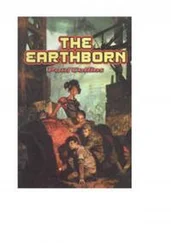ON THURSDAY MORNING, THREE FIRST-UNIT FILM CREWS and six second units were splayed throughout the streets and establishments of greater Los Angeles. Principal photography on Ear to the Ground, more grueling than Ugandan boot camp, would end Monday at midnight — if all went well.
The day’s excitement began with a scene — a shot really — where the camera was simply meant to record Bridge Bridges looking out the second-floor window of a crumbling apartment building in Northridge. Why it took so long to set up was anyone’s guess. In the finished film, the image would precede the “WHAT-HE-SEES” shot, of a child crying in an adjacent window, which had been filmed two weeks earlier.
Bridge, deep in character and annoyed at having to stand around so long, had the impulse, on the second take, to bound from his window onto the trunk of a coconut palm he’d been watching sway gently for nearly an hour. He sprained his ankle.
At the same time, at the “B-Set” in the San Bernardino desert, ninety halogen lamps were being prepped to ignite in a flash near what would be the great quake’s epicenter. The effect would last half a second onscreen, cost ninety thousand dollars, and hopefully inject a spiritual angle into the latter part of the story.
The wrinkle began at the “C-Set” downtown, at five o’clock, when a vehicle from the sheriff’s office pulled up in front of the unit production manager’s trailer. A deputy got out and knocked on the trailer door. He was told by a harried-looking girl that the UPM was currently on-set, and the girl began giving him directions.
“Just get him over here for me.”
Fifteen minutes later, setups had ceased and cameras had stopped rolling in all three locations. Deputies held sway over their operations. No explanation was given.
It had been a shrewd decision on the part of Jon Kravitz and his lawyers to wait before they went after Warner Brothers. Now they could name their price. Ten million dollars had been their first demand, to test the waters in the sea of negotiation.
Consensus had been reached that Ian had spoken to Jon about Ear to the Ground. Jon’s ideas had found their way into the script, and some of his bits had been committed to celluloid.
But Bob Semel and Ethan Carson were in agreement: Warner Brothers had bought from Ian Marcus what they assumed was his to sell. They owed nothing further, they felt, to either party. Michael Lipman, Ian’s literary representative, denied everything and refused to relinquish any commissions.
Interested parties had assembled in the Warner’s eighth-floor suite at the Four Seasons Hotel. Ian’s lawyer was talking to Jon Kravitz’s lawyer, or, rather, listening to him; Bob Semel and Ethan were on separate phones. Henny Rarlin showed up briefly with a girl on his arm, not his wife. Grace stopped by, and so did Dr. Ehrich Weiss, who assumed the air of a priest giving last rites.
Ian sat outside on the balcony, thinking about how fucked up life was, and how ridiculous it was to try to understand it. He really wanted a blended margarita more than anything, but worried that it was inappropriate. His feet were up on the railing, and he could feel lines forming around his eyes. How could this be happening?
Again, he did the math. Tax and commissions. The expenditures: first-class airline tickets, hotels, lunches to impress friends, tips out the wazoo, little things that catch the eye in boutique windows, taxis (just put your hand in the air!), the bottles of French wine he now took to dinner parties, the Mercedes, the fresh-water aquarium, the linen suits and silk shirts and socks that cost twelve dollars a pair, the beautiful bags of Humboldt green, and, of course, the incidentals: “Champagne, waiter!” Or, “Let’s go to Vegas!”
Ehrich Weiss poked his head onto the balcony. “How are you?” he asked.
“Bad.”
“Life goes on. It’s not the end of the world.”
Ian stared into space.
The doctor waited a moment. “Somebody wants to see you,” he said, and disappeared.
Grace, Ian thought. It would have to be. She had always been attracted to his heartache, and Ian suspected she would be there in his darkest hour. She was dependable, if a bit tight around the lips. She meant well, and he guessed he loved her. Would always love her. Grace.
A moment later, Jon Kravitz came onto the balcony.
“Hey, man,” he said. Ian couldn’t look at him, and it took a moment to realize what was going on. Jon continued: “Just wanted to say it’s not a personal thing. It’s business. And I hope it doesn’t put a permanent damper on our friendship.”
“What?”
“It’ll probably be a while before we have the kind of trust we once did. Just wanted to say if there’s anything I can do …” He nodded, and went inside.
Ian put his head in his hands. Then he got up, opened the door to the suite, and went to inspect the minibar.
AT 4:15 ON THURSDAY AFTERNOON, THE HORSE AND BUGGY, a workingman’s bar on Roscoe Boulevard in Northridge, was empty except for an elderly man drinking alone, a couple of kids from CSUN, and Henry Grant. He sat in the shadows, sipping a beer and talking to Eddie, the bartender, with whom he had a long, though glancing, acquaintance.
“Mike Blowers?” Henry was saying. “I wouldn’t trade my mother-in-law for Mike Blowers.”
“Your mother-in-law’s dead, Henry.”
“Thank Christ. She still plays a better third base.”
Eddie looked down and took a swipe at the bar’s burnished surface with a wet rag. “Come on, Henry. Two weeks, there ain’t gonna be any Dodgers. No Dodger Stadium.”
“That earthquake’s never gonna happen.”
“No?” Eddie gestured at the empty room. “Then where is everybody? Take a look outside. You ever see so many moving vans in your life?”
“Yeah, yeah, yeah.” Henry waved him off. “All my neighbors are moving away …”
“That doesn’t worry you?”
Henry took a long pull off his beer. “Where the hell am I gonna go?”
Emma was sitting in the living room, watching Ricki Lake interview earthquake survivors about stress, when the doorbell rang. On her way to answer it, she glanced toward the backyard, where Dorothy was running in and out of her playhouse.
A short, stocky man in a business suit stood on the front steps. He clutched a peeling leather briefcase.
“Mrs. Grant?” he asked, and offered her a card. “Frank Baum, American Realty Company. Like to talk to you about your home.”
“My husband isn’t here.” Emma regretted the words as soon as she’d said them. How stupid she must sound, like a child, unable to make a decision on her own. “I guess it’d be OK for a minute,” she amended.
Inside, they sat around the kitchen table.
“You’ve owned this place how long?” he asked.
“About thirty years. It was my parents’ house.”
“Like to sell it?”
Emma didn’t know how to answer. From the corner of her eye, she caught a glimpse of the backyard — of Dorothy tearing up her playhouse with glee. She envied her daughter’s innocence, until she remembered the last quake, when the ceiling had collapsed and the little girl’s arm had snapped like a twig. Sell the fucking house, she thought.
“I might,” Emma said.
“Like to sell it today ?”
“Today?”
“Your neighbors are gone.”
“Not this minute. I don’t think I can.”
“When?”
“I don’t know.”
“Correct me if I’m wrong. I just heard you say you wanted to sell it.”
“Well, I…”
Читать дальше












